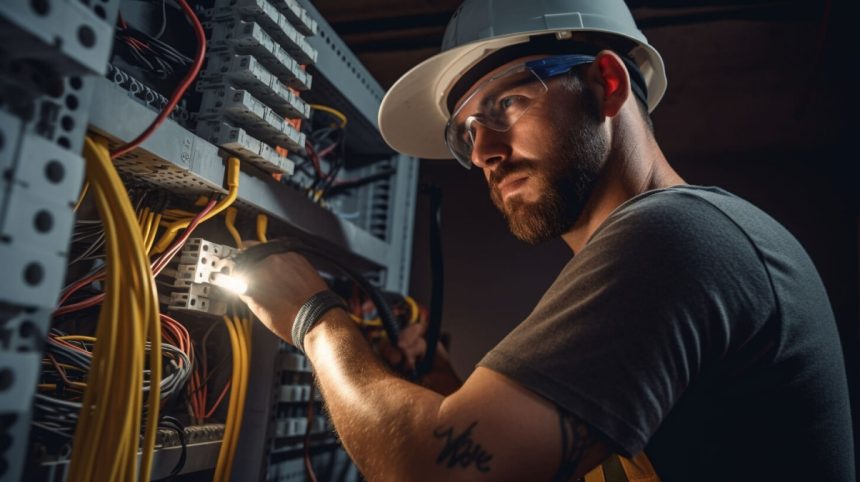The field of electrical work has evolved significantly over the years, with technology playing a pivotal role in enhancing efficiency, safety, and accuracy. Modern electricians such as emgelectrical.ie now have access to a wide array of advanced tools and systems that streamline their tasks and help them stay ahead in a rapidly changing industry. In this read, we are going to delve into the latest technology used by electricians today, illustrating how these innovations are transforming the profession.
A. Smart Tools & Equipment
One of the most notable advancements in the electrical industry is the development of smart tools and equipment. These devices offer unparalleled precision and convenience, making them indispensable for contemporary electricians.
(i) Smart Multimeters
These are at the forefront of this technological revolution. Unlike traditional multimeters, smart multimeters provide accurate readings and data logging capabilities. Electricians can now measure voltage, current, and resistance with greater precision and store the data for future reference, simplifying troubleshooting and ensuring consistency in their work.
(ii) Thermal Imaging Cameras
Thermal imaging cameras are another game-changer. These cameras allow electricians to identify electrical hotspots and potential hazards that are invisible to the naked eye. By detecting temperature variations, thermal imaging cameras help prevent electrical fires and ensure the safety of both electricians and their clients.
(iii) Digital Clamp Meters
With digital displays and enhanced measurement capabilities, digital clamp meters allow electricians to measure current without disconnecting circuits. This not only saves time but also reduces the risk of accidents.
(iv) Wireless Inspection Cameras
These have revolutionized the way electricians inspect hard-to-reach areas. These cameras can be manoeuvred into tight spaces, providing clear visuals of electrical systems and components. This technology eliminates the need for disassembly and allows for more efficient diagnostics and repairs.
B. Advanced Diagnostic Software
The integration of advanced diagnostic software into electrical work has further enhanced the capabilities of modern electricians. Some of the solutions include:
(i) Mobile Apps & Software
Nowadays, electricians can use their smartphones or tablets to access detailed schematics, run diagnostic tests, and receive real-time updates. This connectivity streamlines the diagnostic process and improves overall efficiency.
(ii) Cloud-Based Systems
These solutions offer real-time data access and remote diagnostics, allowing electricians to monitor electrical systems from anywhere. This technology is particularly useful for large-scale projects and maintenance, as it enables remote troubleshooting and minimizes downtime.
C. Renewable Energy Solutions
As the world shifts towards sustainable energy sources, electricians are increasingly involved in the installation and maintenance of renewable energy systems.
(i)Solar Power Systems
Solar power solutions have become more prevalent, and electricians use advanced tools to ensure their efficient installation and operation. Devices like smart inverters and monitoring systems allow electricians to optimize the performance of solar panels and address issues promptly.
(ii) Energy Storage Solutions
This area has also experienced substantial advancements. Modern battery technology enables the storage of excess energy for later use, improving the reliability of renewable energy systems. Electricians play a crucial role in installing and maintaining these systems, ensuring that they function seamlessly.
(iii) Smart Grid Technology
The smart grid allows for better management of energy distribution and consumption, enhancing the stability and efficiency of the power grid. Skilled electricians such as mmkelectricians.ie are essential in integrating smart grid technology into existing infrastructure and ensuring its optimal performance.
D. Smart Home Integration
The rise of smart home technology has ideally opened up new opportunities for electricians:
(i) Home Automation Systems
Automation solutions for households are becoming increasingly popular, and electricians are responsible for their installation and setup. From smart lighting to thermostats and security systems, these devices enhance the convenience and efficiency of modern homes.
(ii) Voice-Controlled Systems
Voice-controlled systems such as Amazon Alexa and Google Home are also gaining traction. Electricians are vital in the integration and setup of these systems, allowing homeowners to control various aspects of their homes using voice commands. This technology not only adds convenience but also enhances the overall smart home experience.
E. Safety Innovations
Safety is paramount in electrical work, and modern technology has introduced several innovations that enhance the safety of electricians and their clients.
(i) Personal Protective Equipment (PPE)
Thanks to technological advancements, PPEs nowadays include smart helmets and gloves that provide real-time data on environmental conditions and the electrician’s health. This technology ensures that electricians are always aware of potential hazards and can take preventive measures.
(ii) Safety Monitoring Systems
These are essential for ensuring compliance with safety standards. These systems utilize sensors and alarms to detect unsafe conditions and alert electricians in real time. By continuously monitoring the work environment, these systems help prevent accidents and injuries.
Conclusion
The latest technology is revolutionizing the field of electrical work. From smart tools and advanced diagnostic software to renewable energy solutions and smart home integration, modern electricians have access to a wide array of innovations that enhance their efficiency, accuracy, and safety. By leveraging these technologies, electricians can stay ahead in a rapidly changing industry and continue to provide exceptional service to their clients.
Lynn Martelli is an editor at Readability. She received her MFA in Creative Writing from Antioch University and has worked as an editor for over 10 years. Lynn has edited a wide variety of books, including fiction, non-fiction, memoirs, and more. In her free time, Lynn enjoys reading, writing, and spending time with her family and friends.















